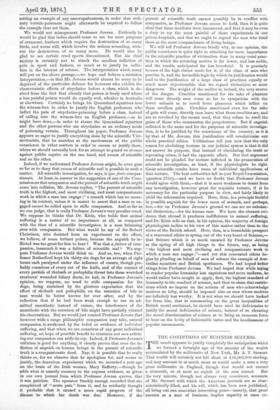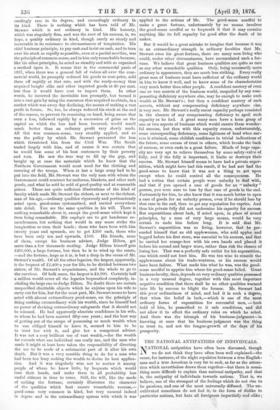THE CONDITIONS OF BUSINESS SUCCESS.
913HE result appears to justify completely the anticipation which we formed a fortnight ago of the amount of the wealth accumulated by the millionaire of New York, Mr. A. T. Stewart. That wealth will certainly not fall short of i16,000,000 sterling, and may amount to as much more as would make a man a very great millionaire in England, though that would not exceed a sixteenth, or at most an eighth of the sum named. But the very minute, though not always very consistent, accounts of Mr. Stewart with which the American journals are so char- acteristically filled, and his will, which has been now published, all bring out one somewhat interesting point—namely, that great success as a man of business, implies capacity at once ex-
ceedingly rare in its degree, and exceedingly ordinary in its kind. There is nothing which has been told of Mr.
Stewart which is not ordinary in kind. His honesty, which was singularly firm, and was the root of his success, is, we hope, a quality ordinary in kind, though rarely so steady and inexorable in its resistance to circumstances of temptation. His chief business principle, to pay cash and insist on cash, and to turn over his stock as rapidly as possible, even at a partial sacrifice, was the principle of common-sense, and in him only remarkable because, like his other principles, he acted so steadily and with so organised a method upon it. It seems that in the commercial panic of 1837, when there was a general fall of values all over the com- mercial world, he promptly reduced his goods to cost-price, sold them off rapidly at that rate, and with the ready-money thus acquired bought silks and other imported goods at 60 per cent. less than it would have cost to import them. In other words, he incurred the inevitable loss promptly, but turned it into a vast gain by using the resources thus acquired to obtain, in a market which was every day declining, the means of making a vast profit in future. So, too, he always reduced his stock at the end of the season, to prevent its remaining on hand, being aware that even a loss, followed rapidly by a succession of gains on the capital on which the loss had been incurred, would result much better than an ordinary profit very slowly made. All this was common-sense, very steadily applied, and so was the policy by which Mr. Stewart prevented the loss which threatened him from the Civil War. The South traded largely with him, and of course it was certain that he would lose some of his best customers by their poverty and ruin. He saw the true way to fill up the gap, and bought up at once the materials which he knew that the Northern Government would most need for the clothing and covering of the troops. When at last a large army had to be put into the field, Mr. Stewart was the only man with whom the Government could contract for uniforms, blankets, and other such goods, and what he sold he sold of good quality and at reasonable prices. These are quite sufficient illustrations of the kind of faculty which made Mr. Stewart the richest, or next to the richest, man of his age,—ordinary qualities vigorously and pertinaciously acted upon, good-sense systematised, and carried everywhere into detail. You see the same qualities in his will. There is nothing remarkable about it, except the good-sense which kept it from being remarkable. His employes are to get handsome re- membrances, but nothing that would in any sense strike the imagination or turn their heads ; those who have been with him twenty years and upwards, are to get £200 each, those who have been only ten and upwards, £100. His friends, none of them, except his business adviser, Judge Hilton, get more than a few thousands sterling. Judge Hilton himself gets £200,000, a large fortune, but then he is to wind up the estate, —and the fortune, large as it is, is but a drop in the ocean of Mr. Stewart's wealth. Of all the other legacies, the largest, apparently, is the bequest of £2,400 a year for life, to be divided between two sisters, of Mr. Stewart's acquaintance, and the whole to go to the survivor. Of bulk sums, the largest is £4,000. Certainly half a million would cover all the legacies bequeathed completely, in- cluding the large one to Judge Hilton. No doubt there are certain unspecified charitable objects which he enjoins upon his wife to carry out for him, but for the most part, Mr. Stewart seems to have acted with almost extraordinary good-sense, on the principle of doing nothing extraordinary with his wealth, since he himself had no power of devising extraordinary safeguards that it should not be misused. He had apparently absolute confidence in his wife, to whom he had been married fifty-one years ; and the best way of getting out of the scrape of possessing so much wealth when he was obliged himself to leave it, seemed to him to be to trust her with it, and give her a competent adviser. It was not a very brilliant use of vast wealth,—for the wealth far exceeds what one individual can really use, and the man who made it might at least have taken the responsibility of directing the use to be made of a substantial part of it after his own death. But it was a very sensible thing to do for a man who had been too busy making the wealth to devise its best applica- tion. And it was singularly wise not to scatter it among people of whom he knew little, by bequests which would turn their heads, and make them in all probability less useful citizens in time to come. Still, the will, like the mode of making the fortune, certainly illustrates the character of the qualities which best ensure remarkable success,- good-sense very common in kind, but very unusual indeed in degree and in the extraordinary system with which it was
applied to the actions of life. The good-sense needful to make a great fortune, unfortunately by no means involves the good-sense needful so to bequeath it that it may exercise anything like its full capacity for good after the death of its maker.
But it would be a great mistake to imagine that because it was to an extraordinary strength in ordinary faculties that Mr. Stewart owes his great fortune, there are many men living who could, under other circumstances, have accumulated such a for- tune. We believe that great business qualities are quite as rare as any other remarkable qualities. Only, being necessarily more ordinary in appearance, they are much less striking. Every really great man of business must have sufficient of the ordinary world in him to know it well, and to know some of its characteristics very much better than other people. A confident mastery of even one or two secrets of the business world, unspoiled by any com- pensating deficiency anywhere else, may be enough to make such wealth as Mr. Stewart's ; but then a confident mastery of such secrets, without any compensating deficiency anywhere else, is very rare. Mr. Stewart's really rarest capacity perhaps consisted in the absence of any compensating deficiency to spoil such capacity as he had. A great many men have a keen grasp of one or two aspects of business which would ensure them wonder- ful success, but then with this capacity comes, unfortunately, some corresponding deficiency, some lightness of head when suc- cess is attained, some childish confidence in trivial indications of the future, some excess of trust in others, which breaks the back of success, or even ends in a great failure. Minds of large capa- city are very apt to relieve themselves by some safety-valve of folly, and if the folly is important, it limits or destroys their success. Mr. Stewart himself seems to have had a private super- stition, which might have had this result, if he had not had the good-sense to know that it was not a thing to act upon except when he could control all the consequences. He had a notion that certain people were unlucky to deal with, and that if you opened a case of goods for an " unlucky " person, you were sure to lose by that case of goods in the end. Fortunately for him, he also knew that it was much better to open a case of goods for an unlucky person, even if he should lose by that case in the end, than to get any reputation for caprice. And thus his private folly did not undermine his capacity for success. But superstitions about luck, if acted upon, in place of sound principles, by a man of very large means, would be very certain to undo him before long. It is said that Mr. Stewart's superstition was so living, however, that he per- suaded himself that an old applewoman, who sold apples and begged before his first store, was essential to his success, and that he carried her orange-box with his own hands and placed it before his second and larger store, rather than risk the chance of losing her. That was a perfectly safe outlet for his superstition, one which could not hurt him. He was too wise to consult the applewoman about his trade-ventures, or his success would have been failure. What made him what he was, was the good- sense needful to apprize him where his good-sense failed. Great business faculty, then, depends on very ordinary qualities possessed in a very unusual degree, together with this most important negative condition that there shall be no other qualities warmed into life by success to blight the former. Mr. Stewart had this great ordinariness of mind, and had it in such a degree, that when the belief in luck,—which is one of the most ordinary foram of superstition for successful men, -- took hold of him, he prescribed to it safe conditions, and did not allow it to affect the ordinary rules on which he acted. And there was the triumph of his business-judgment—in knowing at once that his business-judgment was the thing to trust to, and not the fungus-growth of the days of his prosperity.



































 Previous page
Previous page